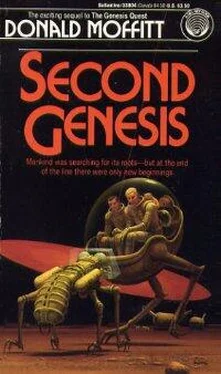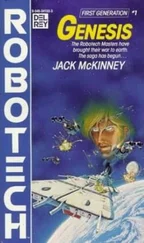“We’ve already shed some velocity diving through the globular clusters,” Jao said. “And there’s plenty of mass in the central bulge, even though it’s not as concentrated as the one that sent us on our way.” His hands sketched the glowing egg in the holo behind him. “We dive straight down through the nice, nourishing H-II regions we’re going to find in there, we make a tight demiorbit around the central three parsecs, a safe distance outside the core that contains the black hole, the central star cluster, and the rotating inner ring of ionized gas. The normal orbit at that radius—if we wanted to stay there—takes ten thousand years, so we apply vector to turn it into a powered orbit. Nevertheless, we start to spiral out in spite of ourselves, in flatter and flatter spirals that bring us into the plane of the galaxy. And the spirals are retrograde, of course, so we’re using the magnetic brake of the nucleus itself. Nothing to it! It’s as easy as tomato pie! Isn’t that so, Bram?”
Bram, startled out of his reverie, said, “Uh, certainly. The Milky Way turns out to have a very strong magnetic field at the center from what certain of our observations seem to indicate, and we ought to be able to use its rotation to slow us down considerably—just the opposite of the magnetic assist we got at departure.”
He glanced at the peculiar arc that could be seen growing out of the center of the galaxy’s golden yolk like a spray caused by a pinprick. It wasn’t a very large scale feature—only a few thousand light-years in extent—and its meaning was still being debated by the astronomy department; there was no need to go further into it at this moment.
“The galaxy’s made a quarter rotation in the last seventy-four million years,” Jun Davd interposed smoothly. “Or, rather, Original Man’s neighborhood in one of the spiral arms has. We had to allow for that, too. I hope everyone appreciates the brilliant job of orbital plotting that Jao’s department did.”
Jun Davd was as imposing as a young man as he had been when he was old. He’d become even taller with the reversal of calcium loss in his spine and carried his slim, smooth-muscled body with an easy grace that his older incarnation had only hinted at. Bram could never quite get used to seeing him without white hair, though.
“Well, I suppose if we’ve come this far, we can wait another forty years,” Jao’s heckler conceded grudgingly. Bram recognized him as one of the younger passengers who had been born on the trip. He was probably under a century old, and forty years would seem like forever to him.
“Oho, hold on minute,” Jao said with a malicious glint in his eye. “After we get to the volume of space we think Original Man’s message came from seventy-four million years ago, we still have to find the suns he used. That could take us another century or two if we don’t get lucky right away. We can do some preliminary sifting from a distance, but every time we want to stop and examine a G-type star firsthand, we’ve got to spend a year boosting down from relativistic speeds, a year boosting up to get to the next one, and at the low gamma we build up for these short hops, at least a couple of years in between. Unless you don’t mind gaining a lot of weight, that is!”
“Why do we have to find one of Original Man’s worlds at all?” grumbled the slender youth who had once been Doc Pol. Young he had become, but he hadn’t lost his grumpiness. “We’re here, we’re safe in a galaxy that isn’t exploding—why not settle down in the first G-type system we find? Put down roots. Let our descendants go gallivanting around looking for Original Man’s world if they’ve a mind to.”
There was a chorus of opposition to squelch that idea. Nobody wanted to give up on the search now that they were so close. Doc Pol hunched his faunlike head between his shoulders and looked stubborn.
“We’ve waited this long—we can wait a little while longer,” said a woman wearing one of the leaf tabards that had been popular five hundred years back. The costume placed her as one of the old hands—now a minority.
“That’s right,” another person said authoritatively. “Man’s worlds are our best bet, anyway. There’s bound to be some sort of a surviving DNA-based ecology we can adapt to instead of having to start an ecology from scratch from our vats and gardens here. In the meantime, Yggdrasil is a fine world to live on.”
“Too fine,” someone else said. “We have folk aboard who’ve never known any other world. There may be some who’ll prefer to stay in orbit with Yggdrasil. It makes a more benign environment than most planetary surfaces. I know I’d be tempted to stay myself.”
“Until one day you found yourself sailing off to the cometary halo or heading for a nearby star that Yggdrasil thought had the right absorption lines,” some wag said, and everybody laughed.
Jao’s granddaughter, Enyd, claimed attention with a frown and a gesture. She was still chief tree systems officer after all these years, still smooth, cool, and unapproachable. She picked a lover briefly every twenty years or so, but most of the time she remained seemingly wedded to Yggdrasil. The unattached men who had wooed her to no avail called her “the dryad” behind her back.
“Whatever we do, we’ll have to slow down enough to let Yggdrasil absorb a comet or two before too long,” she said. “It’s been showing the effects of drought these last few years.”
The current year-captain, a colorless hydroponicist named Ploz who’d had the support of the sociometrics clique, said with quick concern, “How critical is it?”
“We’re not losing leaves or anything like that. But the reproductive cycle is on hold. And the more recent xylem rings are getting extremely narrow—Yggdrasil’s pretty much shut down its growth these last few years.”
“How much longer before it gets critical?” Ploz persisted.
“I wouldn’t want to wait more than another century or so,” Enyd said severely.
There was a general sigh of relief. Jun Davd said, “Yggdrasil will have its comet long before then.”
Bram hung around until the press of people got too thick for comfort. Then, with a last regretful look at the galaxy’s swollen heart of fire, he elbowed his way out to make room for someone else.
“Don’t forget the meeting tomorrow,” Jao called after him. Bram waved acknowledgment.
When he emerged from the crowd, he found a delegation of four waiting to intercept him—three members of the glib younger set who seemed to be running things these days and one of the former oldsters who’d been around at the start of the journey.
Silv Jaks was the group’s spokesperson, and that was Bram’s clue that the sociometricians had taken a hand in whatever this would turn out to be. Bram wasn’t quite sure what sociometrics was, other than the fact that it had something to do with people in groups—it was one of the jargon-packed new sciences that had sprung up during the trip’s later generations—but its disciples had definite ideas about the running of the tree, and they wielded a lot of influence among the new people.
“Bram—we hoped we’d find you here,” she said briskly. “Do you have a minute to talk?”
“Sure, Silv.” Bram nodded to the group’s senior member. “Hello, Torm.”
“I’ll come to the point,” Silv said. “We represent a committee that wants you to run for year-captain this term.”
“That’s very flattering,” Bram said warily, “but I haven’t been year-captain for over two hundred years. just a working biologist and part-time astronomy assistant these days. There are plenty of qualified people around.
She set her jaw and drew a breath. “We believe you’re the candidate who’s needed at this time.”
Читать дальше












